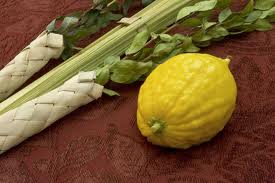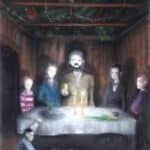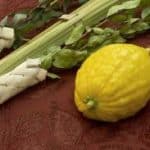By Moshe Kempinski
Drive through many streets in any city in Israel and you will find colorful stands selling the spiritual tools of Sukkoth, lulavim etrogim and assorted decorations for the sukkah dispersed throughout
.
Our Torah tells us;
“And ye shall keep it a feast unto HaShem seven days in the year; it is a statute for ever in your generations; ye shall keep it in the seventh month. Ye shall dwell in sukkoth seven days; all that are home-born in Israel shall dwell in sukkoth ;that your generations may know that I made the children of Israel to dwell in sukkoth , when I brought them out of the land of Egypt: I am HaShem your G-d.( Vayikra 23:41-43)
Our sages disagree as to the meaning of the verse “that your generations may know that I made the children of Israel to dwell in sukkoth “. What is it that they were supposed to remember? According to Rabbi Eliezer, the word “sukkoth” refers to the clouds of glory with which God protected the Jews. Rabbi Akiva teaches that it refers to the actual booths that they lived in during their time in the wilderness.. ( Sukkah 11b).
The understood principle in all such disagreements is ” these and these are the words of living torah”
What then is the core of their disagreement? The essence of the festival of sukkoth is that it is the culmination and fulfillment of the redemptive process began in the month of Elul . A process that then moved through the Days of Judgment of Rosh Hashana and on through the crucible and purifying fire of Yom Kippur, the Day of Atonement.
The days of Sukkoth which should have been celebrated during the month of their Exodus from Egypt, Nissan, is instead celebrated here in the month of Tishrei following the Days of Awe. The Vilna Gaon writes that the heavenly clouds of glory that protected the people were restored on the 15th of Tishrei after having been removed following the sin of the golden calf in the month of Nissan.
What then is the connection between the Clouds of Glory and Tishrei?
During the days of Elul and Tishrei each individual soul undergoes a spiritual voyage that is unparalleled in its intensity and awesome in its implications.
It is in the month of Elul that we begin again the courtship with the Beloved, The letters of Elul standing for the first letters of the verse ” Ani Ledodi VeDodui Lee-I Am My Beloved’s and my Beloved is Mine. The soul clothed in the physicality of reality then enters into the day of Judgment .Yet on this day the focus seems not to be on the judgment but rather on the simple and awesome act of declaring G-d to be Ruler and Majesty of the earth. Only after comprehending the fact of that Rulership can the soul move on through the intensity and supreme focus of the ten days of repentance.
Eventually on the Day of Atonement the soul attempts to disconnect from the physicality of his existence .A day that is spent attempting to mirror the existence of angels. We desist from actions that speak of our physical existence, eating , washing ourselves, the wearing of comfortable shoes and intimate relationships between husband and wife. All this is done in order to remove the spiritual impediments that stand in the way of our relationship with our Creator. Eliminating the sins that impede the intimacy of true connection with the Divine. Yet the process of that purifying and self-inspection leaves our hearts and souls as seared and broken vessels.
The only way to mend a seared and fractured heart is with Joy. The feast of Sukkoth is the antittode as it is the feast of Joy.”VaHayitem Ach Sameach- and thou shalt be altogether joyful” (Deuteronomy 16:15) G-d is not commanding us to be happy. G-d is telling us that we will be!
What then is the greatest Joy. It is the ability to give to one’s true beloved what it is that beloved truly desires. After leaving the intensity of G-d’s very throne room on Yom Kippur we are then told what our Beloved’s desires are.
“And ye shall take you on the first day the fruit of goodly trees, branches of palm- trees, and boughs of thick trees, and willows of the brook, and ye shall rejoice before HaShem your G-d seven days. And ye shall keep it a feast unto HaShem seven days in the year; it is a statute for ever in your generations; ye shall keep it in the seventh month. Ye shall dwell in booths seven days; all that are home-born in Israel shall dwell in booths; that your generations may know that I made the children of Israel to dwell in booths, when I brought them out of the land of Egypt: I am HaShem your G-d. And Moses declared unto the children of Israel the appointed seasons of HaShem. (Leviticus 23:40-44 )
Throughout Jerusalem and throughout the country Jews have spent intense energy and many shekels to find the perfect gift for their Beloved. One of the agents that I deal with in our Old City shop with who represents a large Judaica company told me that for the first time he was meeting with a incredibly heightened desire and need for Sukkoth Judaica all over the country.” Not just in Jerusalem or in Bnei Brak. It is happening all across Israel. “he said” There is something new in the air, it is palpable. ”
He is right, the feeling is palpable and powerful. There is a great stirring in the land. Despite the dangers from without and the decay within the stirring is blossoming like a tender shoot.
It is that stirring that will bring the Great stirring in the Heavens as well.
This then explains the disagreement between Rabbi Eliezer and Rabbi Akiva . They were disagreeing as to which stirring must come first? Which stirring is the most critical? Was it the fact that the Israelites built Sukkoth in the wilderness and then trusted G-d to protect them from the ravages of the barren desert? Was it in fact the Clouds of Glory that first surrounded the people and empowered them to trust?
In Israel we see that a great stirring has begun here amidst us. It instigates or mirrors a great stirring in the Heavens. It is that stirring that brings a clear melding between our earthly Sukkoth and the Heavenly clouds of Glory.A melding of the views of Rabbi Akiva and Rabbi Eliezer.
” these and these are the words of living torah”


